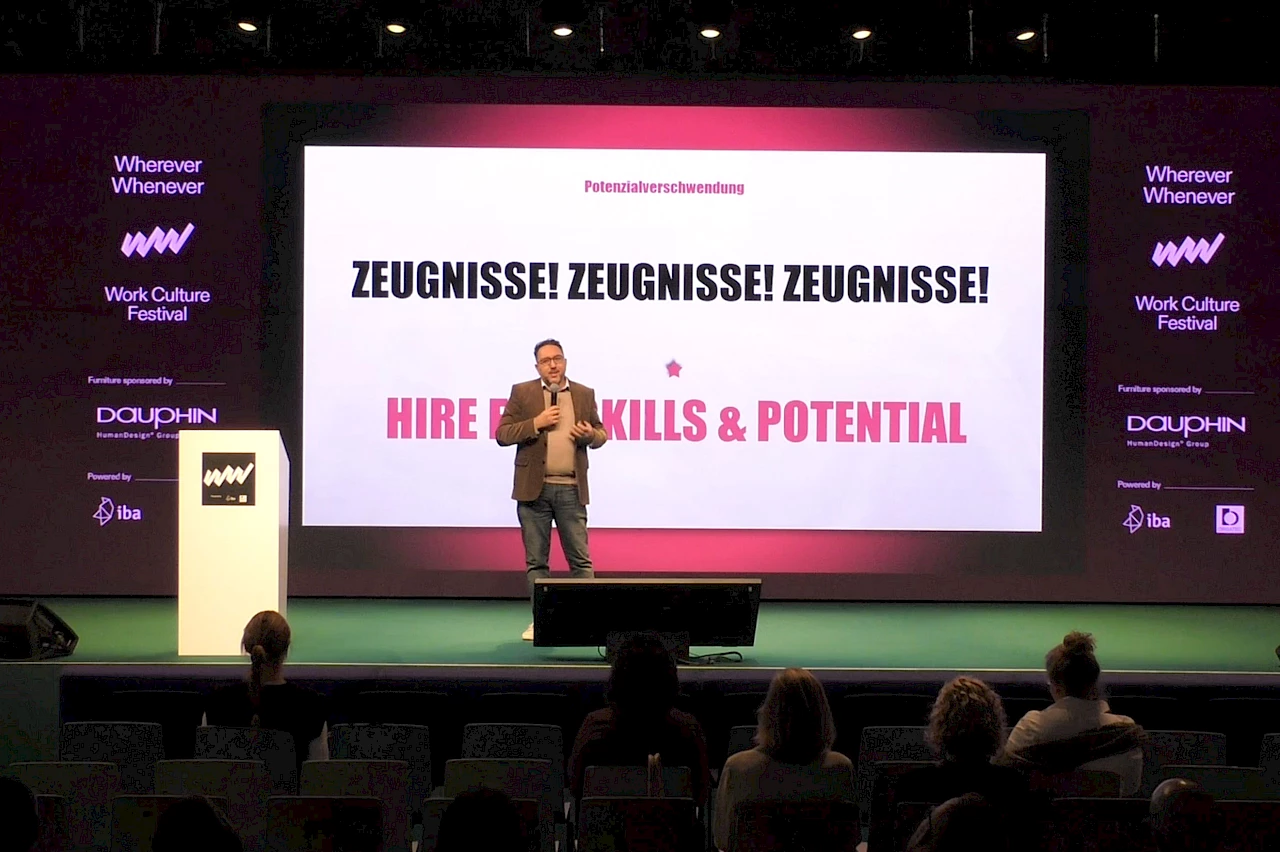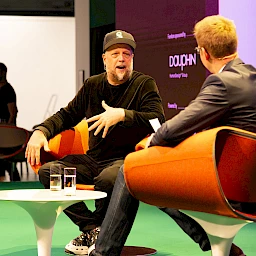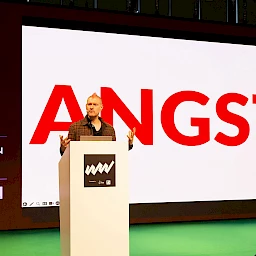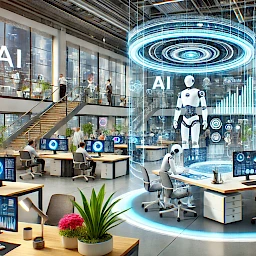At the Work Culture Festival 2024, Cawa Younosi, former Head of Human Resources at SAP Germany and Managing Director of the Diversity Charter, spoke about one of the most pressing problems facing the German economy — the shortage of skilled workers. The theme of his presentation and the subsequent discussion with Michael Trautmann was “The hidden opportunities for people, companies and society”.
Waste of potential and systematic hurdles
Cawa Younosi began the talk with a provocative statement: Germany is wasting potential on a grand scale — from education to the labour market. He showed how closely social background and educational opportunities are linked: “Of 100 children who start out in life, 74 will graduate from high school if they come from an academic household. For children from non-academic families, the figure is only 21.” This inequality continues in professional life. Younosi pointed out that more than 2.5 million people in Germany do not have a vocational qualification — more than there are job vacancies. Instead of integrating these people into the labour market through targeted further training, many remain stuck in low-paid jobs. “The problem is not just migration or education policy, but our entire system, which evaluates people according to formal qualifications instead of focusing on actual skills and potential,” he emphasized. One of his core demands: compulsory training for all those who can be trained.
Diversity as an economic factor: more than just an image factor
A key topic of the talk was diversity, which is still not understood in its full scope. “Diversity is not just a buzzword or an image issue. It is an economic success factor. But instead, we have managed to turn even diversity initiatives into bureaucratic monsters in this country.” One particularly critical point is the low proportion of women in management positions. Despite decades of initiatives and quota regulations, the pace of change is alarmingly slow. “Women don’t have to be channelled through countless mentoring programmes. We should simply promote them, just as we do with men,” demanded Younosi. Women are often checked for every conceivable qualification, while men are often given the assumption that “He’ll grow into it.” “There is no reason why women should not be given responsibility just as quickly and directly. The problem is not their skills, but our structures.”
New ways of recruitment: potential instead of certificates
Younosi sees a further obstacle in traditional recruiting. Too much attention is still paid to certificates and formal education. “In Germany, we hire people according to their formal qualifications, not their actual skills. We know from practical experience that people with potential and the ability to learn are often just as successful as those with perfect qualifications.” Particularly in technical professions such as artificial intelligence or data science, there are often no ready-made experts to be found because the degree programmes have simply not been around long enough. His proposal: More courage for “potential-oriented recruiting”. This means that companies should move away from rigid criteria and instead look specifically for talents who can continue to develop. “It is absurd that we assess people according to their potential when they are already in the company, but not when they apply.” Even the so-called low performers are often not the problem. It is more about whether a person is in the right position and what framework conditions are created for them.
Leadership in times of change: flexibility instead of dogmas
The role of managers was also discussed. “We act as if leadership has completely changed, but it hasn’t,” said Younosi. The core task has remained the same: motivating a team, communicating a vision and leading people to success. However, managers need to be more flexible today, especially in hybrid working models. Younosi warned against a return to rigid attendance obligations in companies. “Many CEOs argue that employees are more productive in the office. But those who force employees to return to the office often end up losing the best people, because they simply go elsewhere.” Instead, companies should establish hybrid working models that are geared towards the needs of the teams. He pointed out that managers themselves often have little freedom to make decisions. “Many of them complain that they hardly have any room for manoeuvre because everything is regulated by guidelines. If even the decision to work from home or in the office is dictated from above, you really have to ask yourself why we still need managers.”
Artificial intelligence: a threat or an opportunity?
When asked by host Michael Trautmann how he sees the role of AI in the world of work, Younosi responded calmly: “The panic about AI is exaggerated. Automation is nothing new. However, it has only affected blue-collar jobs so far. Now it also affects white-collar jobs and suddenly there is a lot of nervousness.” He made it clear that AI is particularly useful where it takes over repetitive activities that nobody likes to do anyway. “Who wants to spend all day reconciling invoices? If AI does this for us, we have more time for what really gets us ahead.” At the same time, he emphasized that AI is first and foremost a tool and not a substitute for human creativity, strategic thinking and interpersonal interaction. “AI can recognize patterns, analyse data and make suggestions, but it cannot create real innovations or manage complex interpersonal relationships.” Younosi argued that companies should use AI as an opportunity to free up employees and give them more room for value-adding activities. “If we use AI wisely, it can free us from unnecessary routines. The key is to enable employees to deal with AI at an early stage — so that they are not replaced by the technology, but rather strengthened by it.”
Outlook: diversity and flexibility as the key to the future
For Younosi, companies and society can only be successful if the full potential of all people can be successfully utilized. “We cannot afford to waste talent through rigid structures, outdated recruiting methods or one-sided working models. Anyone who refuses to embrace diversity and flexibility will not be competitive in the long term.” He called on companies to make bold decisions: “Promote diversity not just as a marketing campaign, but integrate it into your structures. Utilize potential instead of just counting certificates. And create a working world that includes people instead of excluding them. Then we will not only overcome the shortage of skilled workers, but also grow as a society.”
Cawa Younosi is an experienced HR expert and former Head of HR at SAP Germany. He is one of the most influential voices in the field of human resources and is known for his practical and innovative approach to the world of work. Born in 1975, he came to Germany as a refugee and began his career as a labour lawyer before moving into business. At SAP, he headed the global HR organization until October 2023 and championed a trust-based corporate culture. Under his leadership, new working models were introduced, including flexible management structures and a stronger focus on employees. He is also committed to promoting diversity and the integration of refugees into the labour market. As Managing Director of the Diversity Charter, Younosi continues to advocate a modern working world that is more responsive to individual needs and challenges traditional structures. He believes that companies must adapt to their employees — not the other way around.
Cover photo: © IBA







